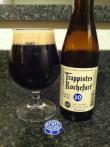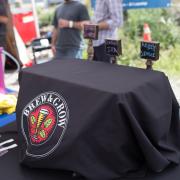My first time using this for a beer. Took an IPA from 1.06 to 1.016 in like 8 days; no diacetyl, no green apple, wonderfully flocculant and clear for a beer with 7 ounces of kettle hops. Has anyone else used this yeast before with similar results? Is it dependent mostly on pitch rate or is it more a case of water and mash?
In a similar vein, if I force carb this I think I'm gonna put some midwest bullshit IPA on tap for Tuesday Brewsday. So you lot better show up. If this actually works out, I guess I'll report back.
Dombie Zust with dry hop grain->glass in 14 days? Fuck yeah.
Speaking of which, anyone who's made Zombie Dust successfully before post the recipe here. I completely winged it this time based on some believing what I read on the internet and definitely came up a little short on the color.
Mash (I assume my typical efficiency -10% due to loss from the hop schedule)
10 2 row
1.5 munich 10
0.5 melanoidin
0.5 cara 10
0.5 cara 40
0.4 acid malt
mash 155
add 1 gram/gallon calcium sulfate to all brewing liquor
acidify sparge water 0.5 ml/gallon 88% lactic acid
Hop Schedule:
1 Citra @FWH
1 Citra @15
1 Citra @10
1 Citra @5
1 Citra @0
2 Citra hopstand 15 minutes
2 Citra dry
Yeast
1 pack WY1968










That yeast is known for being exceptionally flocculent, leading to clear beers. I'm not surprised it has only dropped to 1.016,so far, when I used it on English beers the attenuation was in the 60s, but I would think it might still be dropping your FG at this point. Finally, my experience with it is that it does impart an English character, with some fruitiness, which you might expect.
Can't wait to try it, James - Citra is yummy!
www.singingboysbrewing.com
I'm a fan of this one, too. I use it for English style beers and have been super happy with the results.
Agreed with all of the above with one more point: it really benefits from a temp ramp if you're working with a higher gravity, which is tough to pull off in the CHAOS brewhouse.
With lower gravities, you won't even get there as I don't believe I've ever had 1968 actively ferment longer than 48 hours.
It's cousin, 1728, is also quite flocculent and well behaved.
Myself and Struck made a scottish 70 for Tuesday brewsday using 1728. That beer is great as well.
I feel like I should have known about the secrets of the Fuller's yeast. All this time I thought US-05 was the easy yeast to use for new brewers. Why is this the first I'm hearing about its mythical properties? Makes me seriously question the quality of my beers.